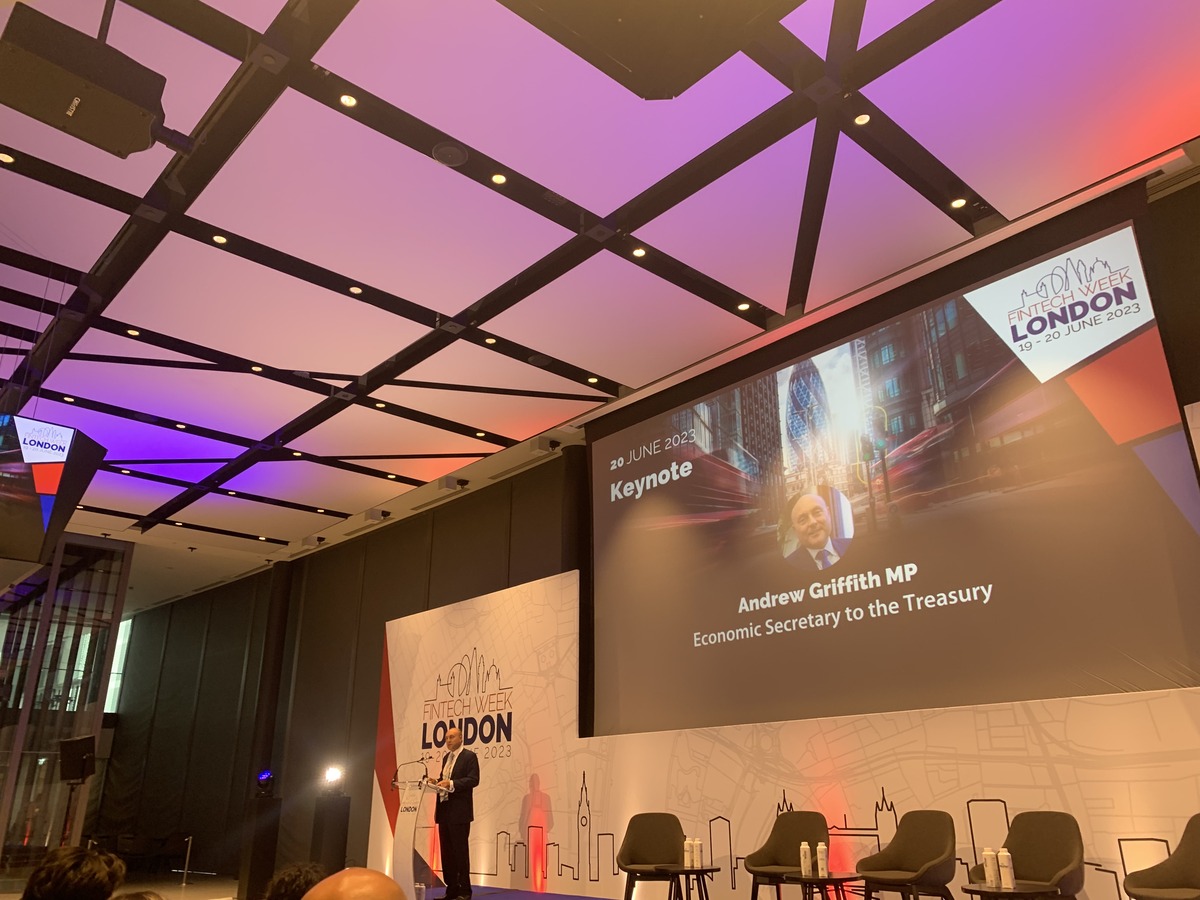Opening the second day of Fintech Week London, Andrew Griffith, Economic Secretary to HM Treasury, praised the UK’s status as a leader for fintech in Europe whilst also outlining expansion plans in artificial intelligence (AI), Web3 and other technologies..
Held at the Tottenham Hotspur Stadium, Griffith admitted that whilst he was an avid Chelsea fan, the state-of-the-art facilities and technology embraced in the stadium are symbolic of the UK’s movement into the next-generation of financial and commercial technologies, something Griffith wants the UK to be a leader in.
He stated: “Like this building’s embracing technology, so too can our fintechs cement our place as a global financial superpower. Innovation is vital in the global contest for the future of financial services.
“I want the UK to be the envy of the world when it comes to innovation, and as we show when we facilitated the sale of Silicon Valley Bank to HSBC, we always do what we can to provide security for the British economy’s most innovative and fast growing sectors.”
The UK Minister was complimentary of various tech companies such as DeepMind, Starling and TrueLayer, all calling London and the UK home when it comes to fostering and enabling growth for the country’s sector.

The UK became only the third country in the world to have a tech sector valued at over $1 trillion, as more and more $1bn valued unicorn startups are born in the country, Griffith was keen to remind the audience that the UK still remains the leading fintech country in Europe.
To help consolidate its leading position as well as searching for new methods of innovation, Griffith revealed that the Government is investing £20bn a year in RND to the country’s fintech sector.
The government also launched the Centre for Finance, Innovation and Technology (CTIF), which aims to establish several new ‘innovation hubs’ across the country to build and create the next best minds in the fintech and technology sector.
Griffith also hailed the country’s position in Open Banking whilst also announcing a new regulatory framework for financial tech.
He stated: “There are now over seven million different users of Open Banking, and are now seeing over a billion successful API calls every month.
“But I believe we can do so much more, and we are in a key moment for the Open Banking regulatory regime. Our vision for the financial data sharing market is fit for the future, increasingly frictionless, competitive and scalable for new technologies and uses.”

The proliferation of AI has caught the world’s attention since the turn of the year, and this is no different in the UK.
Griffith highlighted that due to AI’s increasingly sophisticated softwares and its potential astronomical value to the financial market, AI adoption will be “early and profound”, as well as its contribution to non-linear increases in the prevention of fraud attacks.
With card fraud accounting for £550m in losses in the UK, Griffith believes that AI can help investment managers to prevent such attacks, boldly claiming that “if there ever was a holy grail in our industry” pertaining to enhanced fraud prevention systems, “that comes pretty close”.
Web3 technologies has also led to a “radical rethink” in terms of how the internet will be controlled in the future according to Griffith.
“The UK is on the right path of establishing itself as a global centre for crypto regulation, something I’ve described as the ‘Goldilocks Approach’, not being too hot, not being too cold, striking the right balance between innovation and protection,” commented Griffith.
“With the right regulatory framework in place, our country will continue to thrive as a global tech hub, attracting the brightest minds and revolutionising industries across the board.”

Addressing elements such as AI and Web3 now become clear vehicles of growth Griffith and the Treasury are viewing as the next stage for London and the UK to grow exponentially larger.
But whilst these future technologies may alter the next generation of financial services, the Economic Secretary did not neglect what helped establish the country as Europe’s number one fintech hub, highlighting Open Banking and the plethora of firms contributing to the country’s growth.
As Griffith concluded, he added: “We can never know with absolute certainty what the future will bring. But as Alan Kay stated, ‘the best way to predict the future is to invent it”.
“I believe we have the talent, credentials and regulatory landscape to invent it, and by working closely together, we can strengthen London’s position as a world leading fintech sector.”























